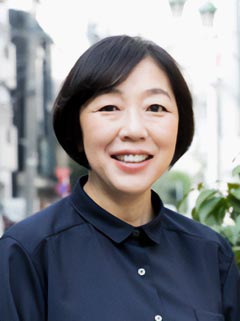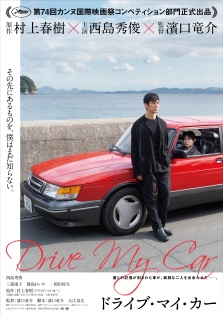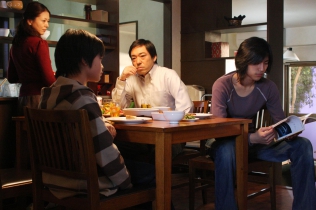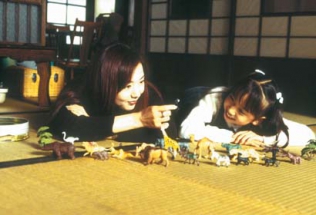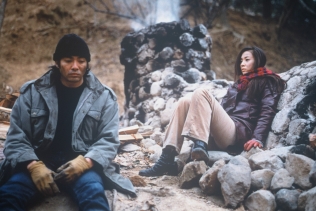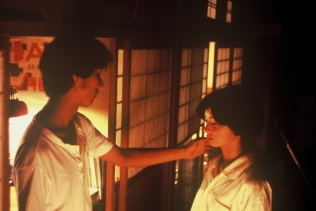The 1990s endeavors that brought emerging filmmakers to international film festivals
Along with the emergence of the internet, the 1990s Japanese film industry heralded an era that enabled young filmmakers born in the 1960s to bring their films directly to global markets through major screenings at international film festivals. The deconstruction of the existing studio system accelerated as conditions emerged through dynamic crossovers with filmmakers, critics and distributors each discovering new talent.
Shochiku producer Okuyama Kazuyoshi was an early mover among the major film studios in the discovery new talent. He sounded out Beat Takeshi when Fukasaku Kinji bowed out of a project, which gave birth to film director Kitano Takeshi and his debut film “Violent Cop”. With this film Okuyama also nurtured Ichiyama Shozo, the film’s producer who later contributed to international film festivals and became director of the Tokyo International Film Festival. Kitano had a major impact on filmmakers with his “world that transmits unexpected violence” appearing as praise for upcoming global luminaries Kurosawa Kiyoshi, Miike Takashi and Aoyama Shinji. In May 1993 his third film “Sonatine” was screened in the Un Certain Regard section at the 46th Cannes Film Festival (Somai Shinji’s “Moving” was another selection that year) and was invited to the London Film Festival the following year. In 1997 “Hana-bi” won the highest honor at the Venice Film Festival with the Golden Lion. At Cannes in 1997 Imamura Shohei’s “Unagi” won the top honor with the Palme d'Or and Kawase Namoi’s “Suzaku” won the Camera d’Or, the prize for best new director.
Kawase’s film was produced by Sento Takenori, who moved into film from the steel industry. At then-WOWOW he produced debut films for filmmakers of the same generation, namely Riju Go’s “BeRLiN” (1995), Aoyama Shinji’s “Helpless” (1996) and Suwa Nobuhiro’s “2/Duo” (1999), and after producing Nakata Hideo’s “Don’t Look Up” (1996) they teamed up once again for the hit “Ring”, which set the stage for the horror boom that made its way to Hollywood. Sento also produced numerous films helmed by Aoyama Shinji. The 3 hour 37 minute black-and-white “Eureka” (2000) won the International Federation of Film Critics Prize and the Prize of the Ecumenical Jury at Cannes, and the film deserves recognition as an achievement that expanded the breadth of Japanese cinematic expression. Aoyama tragically passed away on March 21, 2022, working on a new film with Sento until the very end.
International film festival screenings of films by directors in their 20s and 30s were also enabled through domestic support from the Japan Foundation and Pia Film Festival, as well as the presence of film festival programmers and film critics. Marco Muller was known by all in the film world, and he curated the Asian film selection and collaborated with the Venice International Film Festival from 1980 through 1994. British film critic Tony Rayns programmed numerous film festivals and championed Kitano Takeshi and Miike Takashi in Europe, and Jean‐Michel Frodon wrote about the pioneering nature of Kurosawa Kiyoshi’s “CURE” (1997) in France’s ‘Le Monde’.
Also, Wouter Barendrecht from the Netherlands supported both production and distribution for diverse filmmakers in Asia. In the 1990s his company Fortissimo Films handled world sales for Tsukamoto Shinya’s “TETUSO 2 THE BODY HAMMER” (1991), Mitani Koki’s “Welcome Back, Mr. McDonald” (1997) and Suwa Nobuhiro’s “M/OTHER” (1999). In 1997 he established a base in Hong Kong at the invitation of Wong Kar-wai and embarked on Asia-wide projects. He was also a producer for “Norwegian Wood”, the adaptation of Murakami Haruki’s novel directed by France-based Trần Anh Hùng. One of his most important films was Kurosawa Kiyoshi’s “Tokyo Sonata” (2010). Barendrecht tragically passed away in 2009 at the young age of 43. His name lives on through the esteemed Wouter Barendrecht Award for young talent at the Hong Kong-Asia Film Financing Forum (HAF) held in conjuction with the Hong Kong International Film Festival.
On March 28, 2022, Hamaguchi Ryusuke’s “Drive My Car” was honored with the Academy Award for best international film. The lead producer was Bitters End (headed by Sadai Yuji), which distributed “Suzaku” by Kawase Naomi, who launched her international career in 1997 at Cannes. Now in their 50s, those filmmakers from the 1990s engaged in endeavors that are now bearing fruit through their collaborations with young filmmakers.

